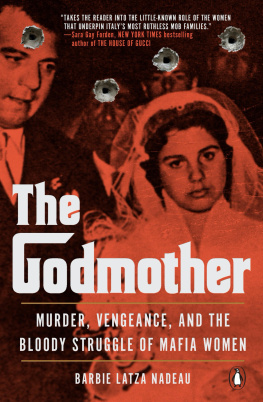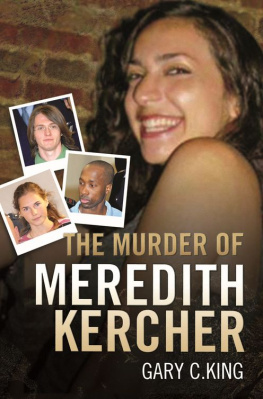Acknowledgments
MEREDITH KERCHERS MURDER was a heinous crime that robbed a young woman of her future and a unique family of their daughter. Her murder trial was a true media circus, but for those of us reporting from the center ring, it was also a profound experience. Though it is no consolation to her family, Merediths memory will live on through all of the friendships that formed among those of us who covered her story.
Thank you to my editor and friend Lee Aitken, who guided this project, turning my on-the-ground dispatches into a real book. Lee invited me to join The Daily Beast by phone late one frigid night as I stood on the steps of the enoteca in Perugia. Through her I have had the most exhilarating adventure embarking on Tina Browns pioneering journey in paperless media and fast book publishing. I am so lucky to be part of it and to work with so many smart people on the Daily Beast team. But I would never have been in Perugia in the first place if not for Newsweek magazine, for which I have worked since 1997. And I would not have received Lees late-night call if my Newsweek bureau chief and trusted friend Chris Dickey had not suggested me for the part.
Very special thanks to Italo Carmignani for his willingness and generosity in sharing his reporting and knowledge of all things Perugian, which proved invaluable as a resource for this book.
Thank you to criminal lawyer Alessandra Batassa in Rome for always engaging on this story and for answering my many criminal-law questions.
Thank you to Andrea Vogt, whose verve as a reporter and friend has taught me more than a few things about integrity and about myself; to Sabina Castelfranco, whose honest friendship and genuine belief in Amandas innocence have helped keep me in check; to Nick Pisa, whose untouchable reporting skills and wit make him the true operatore; and to Chapman Bell, whose dead-sprint enthusiasm made covering this story for so long so much more bearable. Others who have been important to this project, both as reporters and as friends, are Ann Wise of ABC, Marta Falconi of AP, Paul Russell of Fact TV, Massimo Mapelli of La7, and Alessandro Capponi of Corriere della Sera.
Big thanks to my sister Sherri for closely reading this manuscript so many times and for being such an honest critic, and to her, my parents, and my brother for not giving up on me when they easily could have. My deep appreciation goes to my dearest friends in Rome and Nairobi who have been so supportive, have helped with the kids, bought me my morning coffee, and listened to the gory details of Merediths murder ad nauseam.
Last but not least, special thanks to Andrew for continuing to put up with my antics for all these years and to our sons Nicholas and Matthew, who aptly cringe when I mention Perugia.
Perugia Is Not for the Weak
IT IS 2 A.M. on a sticky September night, and Perugia is a cauldron of illicit activity. A thick fog of marijuana hangs over the Piazza IV Novembre. Empty bottles and plastic cups litter the cobbled square. The periphery is lined with North African drug dealers, selling their wares like the fruit vendors who occupy this spot in daytime hours. A group of pretty young British students giggle, easy prey to the Italian guys pouring their drinks. The American girls are more aggressive, eager to nab an Italian lover. Down an alley, a young man has lifted the skirt of his conquest and is having clumsy sex with her under a streetlamp while her drink spills out of the plastic cup in her hand. Dozens of students are passed out on the steps of the church. There is not a cop in sight.
This is the scene that greets the study-abroad crowd when they enroll at Perugias universities for foreigners. It comes as a shock to some and an irresistible circus to others, and it was the backdrop for tragedy in the case of two young women, Amanda Marie Knox, then twenty, and Meredith Susana Cara Kercher, twenty-two, who arrived in the fall of 2007 and enthusiastically joined the party. Less than two months later, Meredith was dead, and Amanda was in prison, accused of her murder.
These young women were not exactly innocents abroad. They had both done their share of college partying before they arrived in Italy. But that was hardly preparation for the nonstop bacchanalia that has made Perugia infamous on the international student circuit. Tina Rocchio is the Italy coordinator of Arcadia University, which facilitates many study-abroad trips. When they want to go to Perugia, my first question is always, How much self-discipline do they have? before I can recommend it, she says. Perugia is not for the weak. The students who go there are of two veinseither they party or they study, and Perugia usually means a party.
In the 1920s, Benito Mussolini established universities for foreigners in Perugia and nearby Siena, aiming to spread Italys superior culture around the world by recruiting foreigners to study cheaply in these lovely, walled cities. The Siena school remains relatively small. But the school in Perugia, in tandem with the citys Universit degli Studi, which also caters to foreigners but has a larger contingent of Italians, spawned dozens of smaller satellite campuses. There are so many that the towns student population is now roughly 40,000, around a quarter of the citys total population of 163,000. Perugia is popular among foreign students looking for something cheaper and cozier than Paris, Barcelona, or Florence, these last three cities being the top choices for well-heeled Americans. The academic offerings are wide-ranging, and the professors have a reputation for being forgiving. Sometimes, the college credits transfer back home as a simple pass-fail mark, when they should actually be given a grade-point score. All this attracts an eclectic mix of young people from around the globe. Most of the Italian kids come from wealthy families; in Italy, university students usually live at home, and it is a rare privilege to go away to school. The foreign studentsthe universities are accredited in Asia, Europe, and North Americaare more likely to be scraping by on scholarships and second jobs. With very few dorm rooms available, the students usually live in the historic center in flophouses and apartments that have been partitioned into tiny rooms to accommodate multiple renters. The town is full of discos, clubs, and cheap restaurants that cater to a student clientele.
No surprise, Perugia is also a drug dealers paradise; the mostly North African merchants do a lively trade in everything from genetically modified hashish to cocaine and acid. It is very easy to get high in Perugia, and the police generally turn a blind eye. Perugia has a very low crime rate compared with the rest of Italy. Despite its reputation, drug arrests are rare, and the police are routinely lenient with the student population. The narrow, cobbled streets, some of which are built in steps, discourage car use, so the students stagger around the city center on foot, and the drunk driving offenses that usually dominate college-town crime dockets are not a problem. Murders are extremely rarewith one notable exception. The year before Meredith was killed, another young woman, Sonia Marra, who was studying medicine at the Universit degli Studi, disappeared without a trace. The body has never been found, and it was only recently that her former boyfriend was arrested in connection with her murderamid suspicions that the investigation into her death was neglected during the two-year circus following Merediths murder.
Perugia was home to the famous artist Pietro Vannucci, who went on to teach Renaissance great Raphael. It is also famous for the Perugina chocolate factory, now owned by Nestl. But without the universities, Perugia would be just another postcard-perfect Umbrian hill town competing for the tourist dollar with Siena, Assisi, and St. Gimagnano. The local community looks askance at the wild student culture, but also knows better than to interfere much with the towns economic mainstay. As one Perugian prosecutor told a reporter, with long-suffering tolerance, This kind of intoxicating freedom gets into these kids so far away from home, this total lack of control, this hunger for experience rules these kids. The universities and administrators of study-abroad programs contribute immensely to Perugia, and they expect the local community to be forgiving. They insist, too, that the party scene is no worse here than any other college town.








